View in other NatureServe Network Field Guides
NatureServe
Montana
Utah
Wyoming
Idaho
Wisconsin
British Columbia
South Carolina
Yukon
California
New York
Rocky Mountain Groundsel - Senecio streptanthifolius
Other Names:
Packera streptanthifolia
Native Species
Global Rank:
G5
State Rank:
S4
C-value:
5
Agency Status
USFWS:
USFS:
BLM:
External Links
General Description
Fibrous-rooted from a simple or branched short rhizome. Stems erect to ascending, 10–50 cm. Herbage glabrate, sparsely arachnoid in leaf axils. Leaves basal and cauline; basal blades oblanceolate to ovate, cuneate, entire to dentate, 2–4 cm long; cauline blades oblanceolate, entire or with lobes or teeth, becoming sessile above. Inflorescence corymbiform of 3 to 20 heads. Heads radiate; involucres 4–7 mm high; phyllaries 13 to 21, glabrous. Rays 8 to 13; ligules 4–10 mm long. Disk corollas 4–7 mm long. Achenes 1–3 mm long, glabrous (
Lesica et al. 2012. Manual of Montana Vascular Plants. BRIT Press. Fort Worth, TX).
Species Range
Montana Range
Range Descriptions
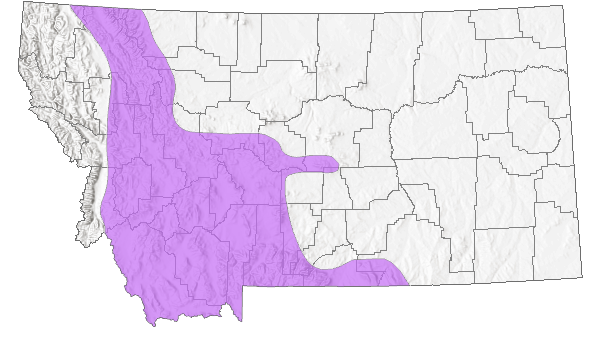
 Native
Native
Range Comments
YT, NT south to CA and NM (Lesica et al. 2012. Manual of Montana Vascular Plants. BRIT Press. Fort Worth, TX).
Observations in Montana Natural Heritage Program Database
Number of Observations: 93
(Click on the following maps and charts to see full sized version)
Map Help and Descriptions
Relative Density
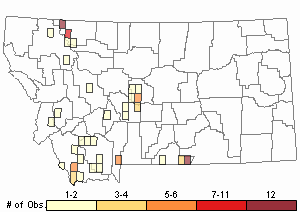
Recency
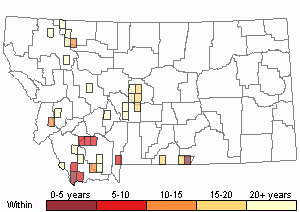
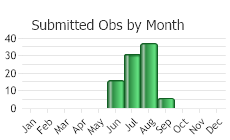
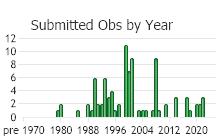
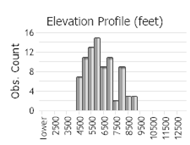 (Observations spanning multiple months or years are excluded from time charts)
(Observations spanning multiple months or years are excluded from time charts)
Habitat
Stony soil of open forest, grasslands, sagebrush steppe, dry meadows; montane, subalpine (
Lesica et al. 2012. Manual of Montana Vascular Plants. BRIT Press. Fort Worth, TX).
Ecology
POLLINATORS The following animal species have been reported as pollinators of this plant species or its genus where their geographic ranges overlap:
Bombus bifarius,
Bombus flavifrons,
Bombus frigidus,
Bombus huntii,
Bombus melanopygus,
Bombus mixtus,
Bombus sylvicola,
Bombus occidentalis,
Bombus insularis,
Bombus suckleyi,
Bombus flavidus, and
Bombus kirbiellus (Schmitt 1980, Thorp et al. 1983, Mayer et al. 2000, Wilson et al. 2010, Pyke et al. 2012, Koch et al. 2012, Williams et al. 2014).
Stewardship Responsibility
References
- Literature Cited AboveLegend:
 View Online Publication
View Online Publication Koch, J., J. Strange, and P. Williams. 2012. Bumble bees of the western United States. Washington, DC: USDA Forest Service, Pollinator Partnership. 143 p.
Koch, J., J. Strange, and P. Williams. 2012. Bumble bees of the western United States. Washington, DC: USDA Forest Service, Pollinator Partnership. 143 p. Lesica, P., M.T. Lavin, and P.F. Stickney. 2012. Manual of Montana Vascular Plants. Fort Worth, TX: BRIT Press. viii + 771 p.
Lesica, P., M.T. Lavin, and P.F. Stickney. 2012. Manual of Montana Vascular Plants. Fort Worth, TX: BRIT Press. viii + 771 p. Mayer, D.F., E.R. Miliczky, B.F. Finnigan, and C.A. Johnson. 2000. The bee fauna (Hymenoptera: Apoidea) of southeastern Washington. Journal of the Entomological Society of British Columbia 97: 25-31.
Mayer, D.F., E.R. Miliczky, B.F. Finnigan, and C.A. Johnson. 2000. The bee fauna (Hymenoptera: Apoidea) of southeastern Washington. Journal of the Entomological Society of British Columbia 97: 25-31. Pyke, G.H., D.W. Inouye, and J.D. Thomson. 2012. Local geographic distributions of bumble bees near Crested Butte, Colorado: competition and community structure revisited. Environmental Entomology 41(6): 1332-1349.
Pyke, G.H., D.W. Inouye, and J.D. Thomson. 2012. Local geographic distributions of bumble bees near Crested Butte, Colorado: competition and community structure revisited. Environmental Entomology 41(6): 1332-1349. Schmitt, J. 1980. Pollinator foraging behavior and gene dispersal in Senecio (Compositae). Evolution 34: 934-943.
Schmitt, J. 1980. Pollinator foraging behavior and gene dispersal in Senecio (Compositae). Evolution 34: 934-943. Thorp, R.W., D.S. Horning, and L.L. Dunning. 1983. Bumble bees and cuckoo bumble bees of California (Hymenoptera: Apidae). Bulletin of the California Insect Survey 23:1-79.
Thorp, R.W., D.S. Horning, and L.L. Dunning. 1983. Bumble bees and cuckoo bumble bees of California (Hymenoptera: Apidae). Bulletin of the California Insect Survey 23:1-79. Williams, P., R. Thorp, L. Richardson, and S. Colla. 2014. Bumble Bees of North America. Princeton, NJ: Princeton University Press. 208 p.
Williams, P., R. Thorp, L. Richardson, and S. Colla. 2014. Bumble Bees of North America. Princeton, NJ: Princeton University Press. 208 p. Wilson, J.S., L.E. Wilson, L.D. Loftis, and T. Griswold. 2010. The montane bee fauna of north central Washington, USA, with floral associations. Western North American Naturalist 70(2): 198-207.
Wilson, J.S., L.E. Wilson, L.D. Loftis, and T. Griswold. 2010. The montane bee fauna of north central Washington, USA, with floral associations. Western North American Naturalist 70(2): 198-207.
- Additional ReferencesLegend:
 View Online Publication
View Online Publication
Do you know of a citation we're missing? Ament, R.J. 1995. Pioneer Plant Communities Five Years After the 1988 Yellowstone Fires. M.Sc. Thesis. Bozeman, MT: Montana State University. 216 p.
Ament, R.J. 1995. Pioneer Plant Communities Five Years After the 1988 Yellowstone Fires. M.Sc. Thesis. Bozeman, MT: Montana State University. 216 p. Clark, D. 1991. The effect of fire on Yellowstone ecosystem seed banks. M.Sc. Thesis. Montana State University, Bozeman. 115 pp.
Clark, D. 1991. The effect of fire on Yellowstone ecosystem seed banks. M.Sc. Thesis. Montana State University, Bozeman. 115 pp. Culver, D.R. 1994. Floristic analysis of the Centennial Region, Montana. M.Sc. Thesis. Montana State University, Bozeman. 199 pp.
Culver, D.R. 1994. Floristic analysis of the Centennial Region, Montana. M.Sc. Thesis. Montana State University, Bozeman. 199 pp. Lesica, P., M.T. Lavin, and P.F. Stickney. 2022. Manual of Montana Vascular Plants, Second Edition. Fort Worth, TX: BRIT Press. viii + 779 p.
Lesica, P., M.T. Lavin, and P.F. Stickney. 2022. Manual of Montana Vascular Plants, Second Edition. Fort Worth, TX: BRIT Press. viii + 779 p. Nunlist, E.A. 2020. Grizzly bears and humans at two moth aggregation sites in Wyoming. M.Sc. Thesis. Bozeman, MT: Montana State University. 110 p.
Nunlist, E.A. 2020. Grizzly bears and humans at two moth aggregation sites in Wyoming. M.Sc. Thesis. Bozeman, MT: Montana State University. 110 p. Quire, R.L. 2013. The sagebrush steppe of Montana and southeastern Idaho shows evidence of high native plant diversity, stability, and resistance to the detrimental effects of nonnative plant species. M.Sc. Thesis. Bozeman, MT: Montana State University. 124 p.
Quire, R.L. 2013. The sagebrush steppe of Montana and southeastern Idaho shows evidence of high native plant diversity, stability, and resistance to the detrimental effects of nonnative plant species. M.Sc. Thesis. Bozeman, MT: Montana State University. 124 p. Simanonok, M. 2018. Plant-pollinator network assembly after wildfire. Ph.D. Dissertation. Bozeman, MT: Montana State University. 123 p.
Simanonok, M. 2018. Plant-pollinator network assembly after wildfire. Ph.D. Dissertation. Bozeman, MT: Montana State University. 123 p. Simanonok, M.P. and L.A. Burkle. 2019. Nesting success of wood-cavity-nesting bees declines with increasing time since wildfire. Ecology and Evolution 9:12436-12445.
Simanonok, M.P. and L.A. Burkle. 2019. Nesting success of wood-cavity-nesting bees declines with increasing time since wildfire. Ecology and Evolution 9:12436-12445.
- Web Search Engines for Articles on "Rocky Mountain Groundsel"





